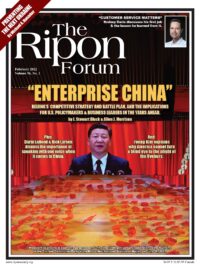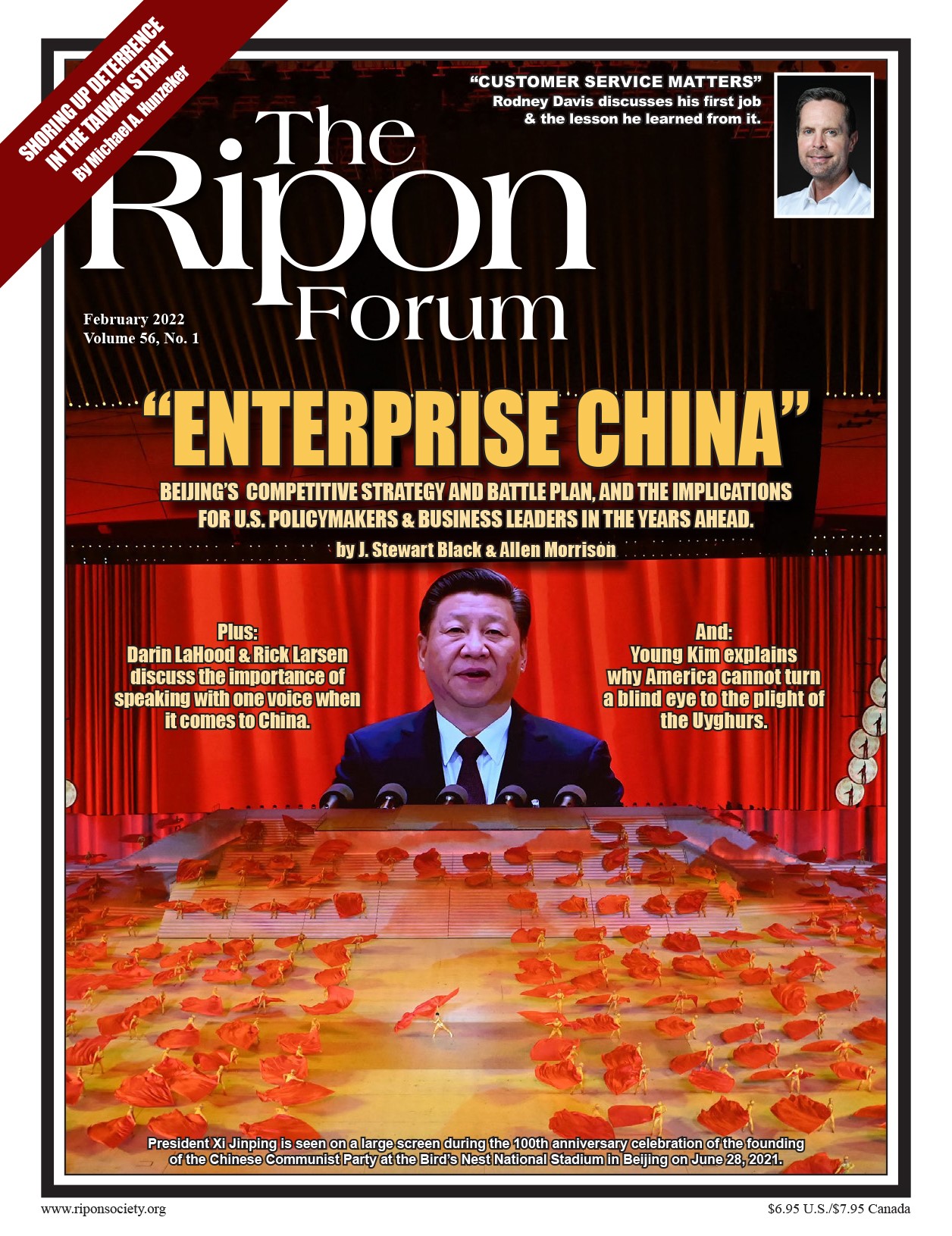Fifty years after President Richard Nixon made his historic trip to Beijing to normalize relations with China, the latest edition of The Ripon Forum examines the global ambitions of the Chinese State and the challenges facing America in that regard in the coming years.
Leading the Forum’s coverage are Professors J. Stewart Black and Allen J. Morrison, who, in an essay entitled “Enterprise China,” argue that the size, scale, and level of coordination between Chinese companies and the Chinese State is not only unprecedented, but is something that U.S. business leaders and policymakers can no longer ignore.
“There are roughly 150,000 State-Owned Enterprises (SOEs) in China,” Black & Morrison write, “and collectively they account for at least 30% of the economy, or $4.5 trillion in revenue. That share alone is greater than the total GDP of any other nation except the United States and Japan … The level of ownership, control, and support of China’s SOEs is also without precedent. In terms of control, the top executives of these SOEs are appointed by and serve at the pleasure of their state owners.”
Black & Morrison argue that the effective “CEO” of Enterprise China is none other than President Xi Jinping himself, and the goal is nothing short of world domination. “Enterprise China’s competitive strategy is not just about protecting itself from foreign invaders,” the pair write. “It is more fully about ‘going out’ and influencing the world. Only in shaping the world can it control its own destiny. Therefore, the implication to both executives and policymakers is simple: Enterprise China is in it to win it, so expect to play hardball.”
To effectively meet this challenge, U.S. Reps. Darin LaHood (IL-18) and Rick Larsen (WA-2) believe it is critical that Republican and Democratic policymakers speak with one voice on Capitol Hill. The pair serve as the Co-Chairs of the U.S.-China Working Group in Congress. In an essay for this latest edition, they discuss the effort they are leading to achieve that goal, and point to specific areas where common ground between the parties can be found. “Now, more than ever,” LaHood & Larsen write, “we must approach U.S. policy towards China in a bipartisan way … we will ensure Congressional attention continues to focus on China’s manipulation of the global free market, threats against its neighbors, and ongoing human rights abuses.”
U.S. Rep. Young Kim (CA-39) examines one of these abuses in an essay focusing on the plight of the Uyghurs and their mistreatment by the Chinese Communist regime. Kim, who has authored a number of bills aimed at ending this mistreatment, writes that: “While Congress has made strides to support Uyghurs, nations and private interests around the world have remained largely silent as the People’s Republic of China continues to ramp up its genocidal campaign. In fact, many U.S. companies have continued to ignore basic corporate responsibility and morality in favor of profit and have not done nearly enough to respond to concerns over the PRC’s human rights violations.”
In other essays focusing on U.S. policy toward China, analysts Barry Pavel & Christian Trotti of the Atlantic Council assess the increasing strength of the Chinese military and its implications for U.S. national security, while Professor Michael Hunzeker examines Taiwan’s ability to defend itself against a possible Chinese attack, and the steps U.S. policymakers should take to make sure such an attack does not occur. With all signs pointing to China becoming a global economic and military superpower in the 21st century, Carl Minzner of the Council on Foreign Relations examines some of the most pressing challenges that President Xi Jinping faces at home that may stand in the way of achieving this goal.
In addition to focusing on the rise of China, the latest edition of the Forum also examines some of the other challenges facing the United States this year. Douglas Holtz-Eakin of the American Action Forum writes about the rising rate of inflation and what policymakers can do to reverse this trend. U.S. Rep. Dusty Johnson (SD-AL) writes about the impact of the supply chain crisis on the economy and the bill he has authored to provide some relief. And Wisconsin State Assembly Majority Leader Jim Steineke writes about the impact of labor shortages on the economy of his home state and the effort he is leading to address these shortages through affordable housing.
With the Centers for Disease Control coming under increased scrutiny for how it has been communicating with the public about the pandemic, three health care experts share their advice for how the agency could make their communications more clear. And in the latest Ripon Profile U.S. Rep. Rodney Davis (IL-13) discusses, among other things, a lesson he learned from his first job and how it continues to shape his service in Congress today.
As always, we hope you find this latest edition of The Ripon Forum interesting and informative, and we welcome any comments or questions you might have.
Lou Zickar
Editor of The Ripon Forum
louzickar@clu.ccw.mybluehost.me





